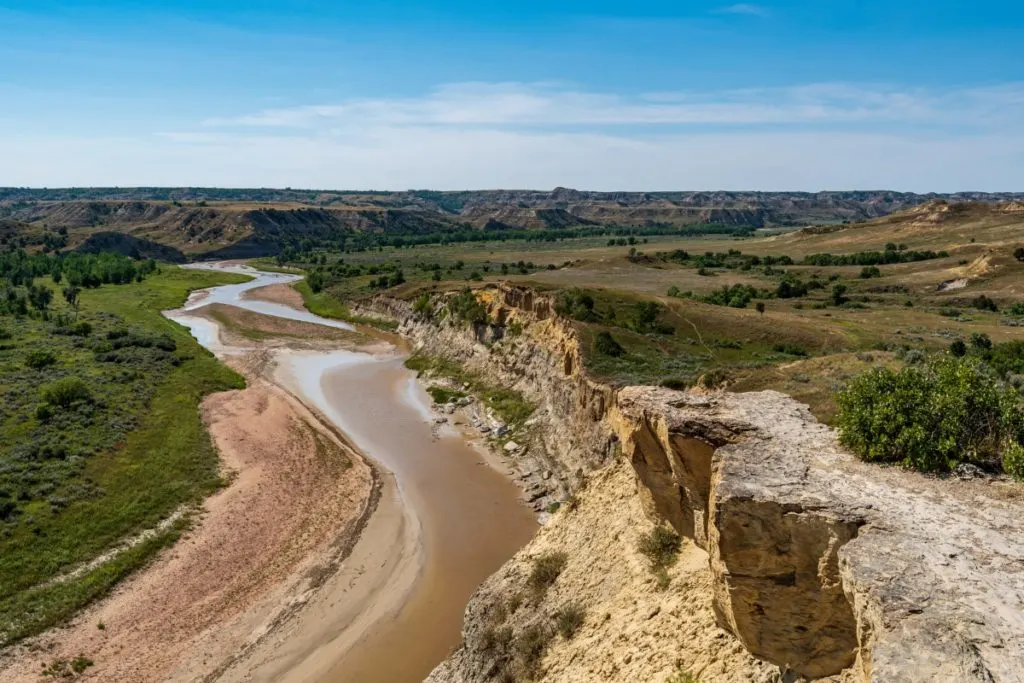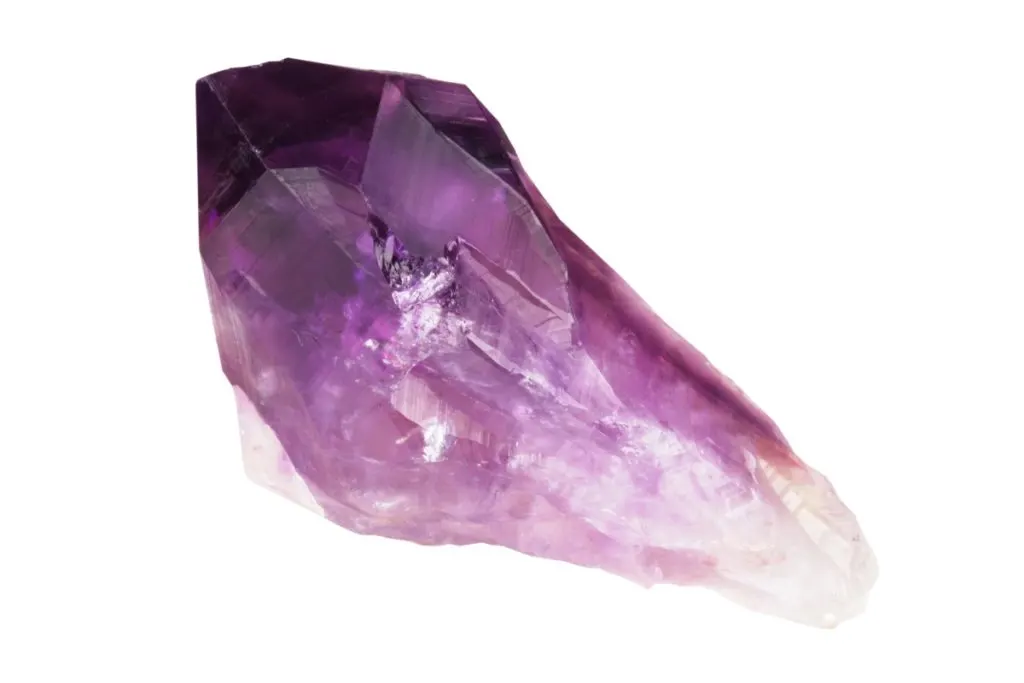As an Amazon Associate, I earn from qualifying purchases with no additional costs for you.
Forget what you think you know about Missouri. This state holds a secret treasure trove for rockhounds – its geology includes the famed Ozark Uplift, one of the world’s most mineral-rich regions.
In Missouri, you can find mozarkite, agates, geodes, quartz, pyrite, chert, jasper, opal, jasper, chalcedony, smithsonite, sphalerite, and various other minerals, and gemstones. The best rockhounding locations are in the state’s northwestern, northeastern, southwestern, and southeastern parts.
The central parts of the state aren’t so rich in their minerals, gemstone, and crystal variety, however, several rockhounding places exist throughout it. Let’s see exactly where you can go to Rockhound in Missouri and what you can find!
If you want to check out the best book about rockhounding in Missouri, you can find it by clicking here (Amazon link).

Best Rockhounding Sites in Missouri
The best rockhounding sites are Indian Creek, Kahoka, Old Mines, Bee Bluff, Fox City, Grand River, Grindstone Creek, Chariton River, Warsaw, Lincoln, Fabius River, Decaturville Crater, Cole, Springfield, Eldon & Etterville, Joplin, Steelville, Ruepple Iron Mine, or Fredericktown, among others.
Let’s take a look at some of these best Missouri rockhounding locations and see what you can find there!
Fredericktown
Fredericktown is among the best rockhounding places in the southeastern parts of the state. Here, in the area mines, you can find several minerals, crystals, and gemstones. Some examples are aragonite, sphalerite, quartz, pyrite, azurite, calcite, cerussite, chalcocite, chalcopyrite, dolomite, galena, malachite, or marcasite.
Old Mines
Another excellent location for rockhounding in the southeastern parts of Missouri is Old Mines. Here, in the area mining dumps you can find drusy quartz, barite, calcite, galena, goethite, malachite, marcasite, pyrite, and chert.
Joplin
In southwestern Missouri, you can head towards Joplin to find various minerals, crystals, and gemstones. All the large area mines and quarries can be searched for apatite, aragonite, sphalerite, pyrite, galena, garnet, azurite, barite, calcite, cerussite, chalcopyrite, dolomite, or chrysocolla, among many other specimens.
Eldon & Etterville
Another great southwestern Missouri rockhounding location is Eldon and Etterville. In the area mines, you can find various things such as barite, chalcopyrite, calcite, cerussite, dolomite, galena, malachite, marcasite, pyrite, sphalerite, or smithsonite.
Decaturville Crater
In the granite pegmatite of Decaturville, southwestern Missouri, enthusiasts can find albite, tourmaline, galena, glauconite, limonite, marcasite, microcline, muscovite, opal, plagioclase, pyrite, and sphalerite.
Fabius River
In northeastern Missouri, one excellent rockhounding location is the Fabius River. Here, just east of Durham, you can find aragonite geodes, barite, calcite, fluorite, malachite, pyrite, quartz, sphalerite, and other rocks, crystals, minerals, and gemstones.
Gentry, Daviess, Grundy, and Livingstone counties
A couple of great northwestern Missouri rockhounding locations are Gentry County, Daviess County, Grundy County, and Livingstone County. Search all the area streams and gravels to find agate, especially Lake Superior specimens, jasper, various fossils, and petrified wood.
BTW: Do you want to know more about rock and mineral identification? The books listed below are the best ones you can find on the internet (Amazon links):
- Smithsonian Handbooks: Rocks & Minerals
- Gemstone & Crystal Properties (Quick Study Home)
- Ultimate Explorer Field Guide: Rocks and Minerals (National Geographic Kids)
Rock Hunting Clubs in Missouri
Rockhounding in Missouri can be made even sweeter with some friends, or by making some new acquaintances. Some of the best rock hunting clubs that you can join in Missouri are Central Missouri Rock & Lapidary Club, Independence Gem & Mineral Society, Mineral Area Gem & Mineral Society.
Some other great rock hunting clubs include the Mozarkite Society of Lincoln. Inc, Osage Rock & Mineral Club, Ozark Mountain Gem & Mineral Club, Rockwood Gem & Mineral Society, Show Me Gems & Mineral Group, Show Me Gold Prospectors, Show Me Rockhounds, Sterling Guild of Greater Kansas City, or Tri-State Gem & Mineral Society.
What Kind of Rocks Are in Missouri?
Various sedimentary, igneous, and metamorphic rocks are found in Missouri. The most popular is the mozarkite rock, which is a form of chert and is a beautiful sedimentary rock. Other popular rocks that you can find include various geodes, agate, flint, obsidian, chert, or staurolite, among others.
| Rock | Location |
|---|---|
| Agates | Gentry County, La Grange, Dexter |
| Obsidian | Mississippi River, Mississippi Valley |
| Geodes | St. Francisville, Fox City, Weber Quarry, Arnold |
| Flint | Doniphan |
| Chert | Current River, Dexter, Timber Knob, Elk River |
| Mozarkite | Warsaw, Lincoln |
Various types of agates can be found in Missouri, and in abundance, with over 35 confirmed locations. For example, in Gentry, Daviess, Grundy, Livingston, or Old Monroe, you can find high-quality Lake Superior agates. Gem-quality agates are found in La Grange, in the gravels of the Mississippi River, and its tributaries.
However, the best location is in Dexter, as here you can find fortification agate, blue, white, pink, and gray varieties, in the gravels and streams to the south.
To find obsidian in Missouri, you should try the sites in the Mississippi River lowlands of southeast Missouri, or east of the Ozark upland in the Mississippi Valley.
When it comes to geodes, Missouri has several geode-abundant locations. The regional creeks and riverbanks of Alexandria & Wayland, or the outcrops along Fox River are some great northeastern examples. In Fox City, north of the bridge on the northeast side of the river, you can find large quartz geodes.
In St. Francisville, at the banks of Weaver’s Branch, is abundant in geodes, some containing aragonite lines, or barite, calcite, fluorite, malachite, pyrite, quartz, sphalerite.
Calcite, fluorite, or millerite geodes can be found in Weber Quarry. In Arnold, just west of I-55, you can find calcite geodes, or dolomite, marcasite, pyrite, or sphalerite geodes.
Flint is very common in Missouri, however, the hardest part is finding good enough specimens to add to your collection. One excellent location in Missouri to find gem-quality flint is in Doniphan. Search the east area surfaces.
When it comes to chert, it is also extremely common in Missouri. To find blue gem-quality chert, you can head towards Elk River, near Bee Bluff.
Gem-quality white chert with yellow bands can be found in Timber Knob. Large gem-quality chert specimens are located in the Current River, near Doniphan.
The fabled mozarkite chert, which is Missouri’s official designated state rock, can be found in Warsaw and Lincoln, in southwestern Missouri.
Search for mozarkite chert in the area quarries, and gravel pits near Lincoln. In Warsaw, chert mozarkite is found in the general area in the low hills west of the Ozark Uplift.
TIP: Tumbler rocks are even more beautiful than raw rocks for some people. It is good to know how much grit and rocks are put in the rock tumbler. Check out the article below and find out the answer:
Rock Tumbler Loading: How Much Grit & Rocks Do You Put In?
What Gems Can be Found in Missouri?

There are various gemstones that can be found in Missouri, some of them in abundance. Some of the most notable include amethyst, rubies, drusy quartz, tourmaline, pyrite, dolomite, opal, jasper, sphalerite, cerussite, topaz, garnet, or chalcopyrite, among many others.
| Gemstone | Location |
|---|---|
| Amethyst | Steelville, Ruepple Iron Mine, Moselle Iron Mines |
| Rubies | – |
| Drusy Quartz | Indian Creek, Old Mines |
| Opal | Kansas City, Decaturville Crater |
The best locations to find amethyst in Missouri are located in the southeastern parts of the state. The area mines, especially the ones to the east, in Steelville, are an excellent location to find amethyst. The Ruepple Iron Mine near Stanton, or the Moselle Iron Mines, west of Vida, are also excellent locations.
Rubies are indeed rare and challenging to find in Missouri. While no specific ruby deposits are documented, you might try exploring limestone quarries and sandstone exposures around Kansas City.
Additionally, the Decaturville Crater might hold potential, but be sure to research any access restrictions and familiarize yourself with the crater’s geological features.
What Minerals Are Found in Missouri?
Missouri is filled with minerals, shining in both diversity, quality, and quantity. Some popular minerals include quartz, diamonds, marcasite, chalcedony, malachite, galena, albite, barite, hematite, calcite, limonite, azurite, goethite, rutile, anglesite, gypsum, or orthoclase, among others.
| Mineral | Location |
| Quartz | Chariton River, St. Francisville, Newark |
| Diamond | – |
| Chalcedony | Gallatin, La Grange, Lincoln |
| Galena | Cole County, Springfield, Crooked Creek Crater |
Quartz minerals are abundant in Missouri. You can find some high-quality specimens at the Chariton River, just 2 miles north of Macon County.
In St. Francisville, you can find quartz in the banks of Weaver’s Ranch. The Fabius River is another excellent location to find quartz in Missouri, just go to the area east of Durham.
Diamonds appear to be quite rare and difficult to find in Missouri. There aren’t any locations marked as worthy of checking out; however, Missouri to Arkansas is a small distance to cover.
There, if you truly want to find diamonds, visit the world-famous Crater of Diamonds State Park, where diamond collecting is legal, and what you find is what you keep.
TIP: Quartz minerals are really popular among all rockhounds. Do you know how many varieties quartz has? Check them out in the article below:
Complete List of Quartz Varieties: Know Them All!
What Crystal Can You Find in Missouri?
Missouri is quite abundant in its crystal variety. You can find calcite crystals, pyrite crystals, quartz crystals, barite crystals, smithsonite, fluorite, drusy quartz crystals, dolomite crystals, sphalerite, bornite, chrysocolla, greenockite, millerite, or vivianite specimens, among others.
| Crystal | Location |
|---|---|
| Quartz Crystals | Chariton River, Indian Creek, Simmons Mine |
| Calcite Crystals | St. Louis, Chariton River, Grindstone Creek |
| Fluorite | St. Francisville, Fabius River, Shepherd Mountain |
An excellent location to find both drusy and smoky quartz crystals is at Indian Creek. Search the gravels one mile southeast of Boulder City. Simmons Mine is also an excellent location to find quartz crystals in Missouri, as well as the Chariton River.
When it comes to calcite crystals, you can try your luck in St. Louis, or the Chariton River, just two miles north of Macon County. Grindstone Creek is also an excellent location to find calcite crystals in Missouri.
What Kind of Fossils Are Found in Missouri?
Various fossils can be found in Missouri. Apart from plant fossils, such as petrified wood, you can also find shark teeth and even dinosaur bones. Septarian nodules, which are fossilized bubbles of mud that create crystal pockets, are also incredibly beautiful and a good find for any enthusiast.
You can find septarian nodules in Sugar Creek, southeast of Rushville, or the Chariton River, two miles north of Macon County. Gentry, Daviess, Grundy, and Livingston counties are also excellent locations to find various fossils, especially petrified wood.
Head to Gallatin, and search the gravels along the Grand river to find petrified wood. In Greenfield, all the gravels and exposures are worth the digging, but you can also find petrified wood at Marble Hill, in southeastern Missouri. Cape Girardeau County, with all its area gravel, is also a good spot.
Marine fossils, such as those of brachiopods, blastoids, crinoids, cephalopods, gastropods, trilobites, bryozoans, or even horn corals, are also common.
Missouri’s past is full of surprises! Thanks to its ancient oceans, you can find fossilized shark teeth across the state. The Missouri River near St. Louis is a prime spot, but don’t forget to explore the Mississippi, White, and Des Moines Rivers as well.
Dinosaur enthusiasts, don’t miss Glen Allen in Bollinger County. This is where they found bones from the fascinating Parrosaurus, a duck-billed dinosaur! Since other dinosaur species have appeared here too, there might be even more thrilling discoveries waiting to be made in this region.
Missouri also holds a treasure trove of Native American artifacts and relics. If you’re dreaming of arrowheads, the best places to search are along the Missouri, Mississippi, White, and Des Moines Rivers. Smaller lakes and creeks can also hide exciting finds.
TIP: Do you know how long all types of rocks form? Interestingly, the formation of different types of rocks takes different lengths. Find out more in the article below:
How Long Do Rocks Form? Answers For ALL Types of Rocks
FAQ About Rockhounding in Missouri
Sill did not find the answer to your answers about rockhounding in Missouri? Find frequently asked questions in the section below:
Is It Illegal to Take Rocks from a Creek in Missouri?
In most cases, it is illegal to take big rocks from creeks in Missouri. What you can take is usually illegal to sell as well. You may take small amounts of rocks from certain creeks, which aren’t regulated, however, always do your research beforehand and ask for permission.
Where Can You Rock Hunt in Missouri?
Various rock-hounding locations exist in Missouri where rock collectors can do their thing. In some areas, you have to pay a fee or ask for permission, while in others, it’s totally fine. Some popular rock hunting areas include Elephant Rocks State Park, Old Mines, Branson, Stockton, and Lincoln.
What is the Official State Rock of Missouri?
The official state rock of Missouri is mozarkite, since 1967. It is a sedimentary rock, a type of fine-grained chert, and its colors vary from red, pink, and purple, to other hues such as green, brown, or gray. It is commonly found near Lake of the Ozarks.
What is Missouri’s State Fossil?
Missouri’s officially designated state fossil is the Delocrinus missouriensis crinoid, since 1989. The Mississippian and Pennsylvanian geological periods are when the crinoids dominated the seascape. However, very rarely are completely preserved specimens found.
What is Missouri’s State Gemstone?
The state of Missouri doesn’t have an officially designated state rock, however, it does have an officially designated state rock (mozarkite), state mineral (galena), state fossil (crinoid, Delocrinus missouriensis), and state dinosaur (Hypsibema missouriensis).
Conclusion
Missouri is a state that might be overlooked, however, this is a big mistake for any true rock hunting enthusiast. With its diversity of minerals, crystals, fossils, gemstones, rocks, collecting areas, and the fact that the Ozark Uplift makes up the state’s geology, it would be a shame not to give it a shot and find some incredible, and sometimes rare specimens.
TIP: What kind of hammer do you use when rockhounding? There is a lot of different types of hammers that can be used. Check out the article about the differences between rock and brick hammer:
Rock Hammer vs. Brick Hammer: Explained Usage for Rockhounding
